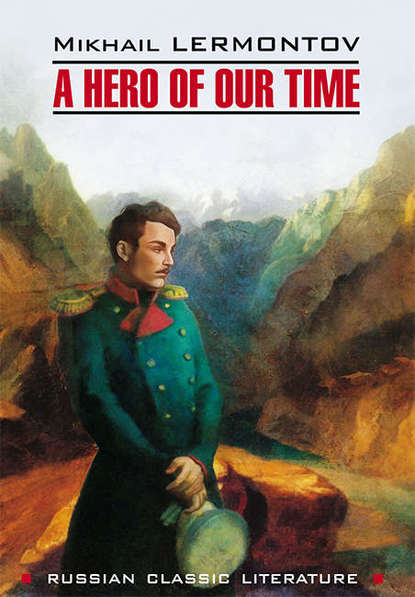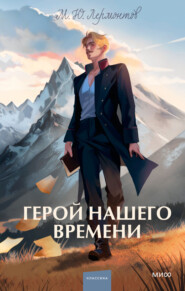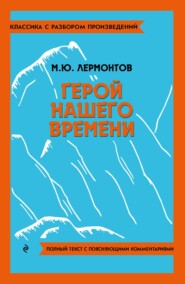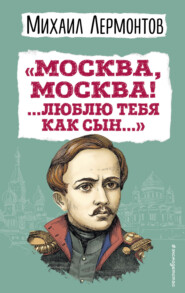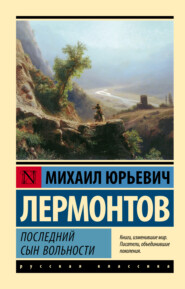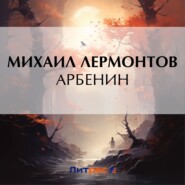По всем вопросам обращайтесь на: info@litportal.ru
(©) 2003-2024.
✖
A Hero of our time / Герой нашего времени. Книга для чтения на английском языке
Автор
Год написания книги
2019
Настройки чтения
Размер шрифта
Высота строк
Поля
So we turned to the left and somehow after a good deal of trouble made our way to the scanty refuge consisting of two huts built of slabs and stones and surrounded by a wall of the same material. The tattered inhabitants gave us a cordial welcome. Later I found out that the government pays and feeds them on condition that they take in wayfarers who are caught by the storm.
“It’s all for the best,” said I, taking a seat by the fire. “Now you’ll be able to tell me the rest of the story about Bela; I’m sure that wasn’t the end of it.”
“What makes you so sure?” replied the captain, with a sly smile and a twinkle in his eye.
“Because things don’t happen like that. Anything that begins so strangely must end in the same way.”
“Well, you guessed right…”
“Glad to hear it.”
“It’s all very well for you to be glad, but for me it is really sad to recall. She was a fine girl, Bela was! I grew as fond of her in the end as if she were my own daughter, and she was fond of me too. I ought to tell you that I have no family. I haven’t heard about my father or mother for some twelve years now, and I didn’t think about getting a wife earlier – and now, you’ve got to admit, it would no longer be quite right. So I was happy to have found someone to spoil. She would sing to us or dance the Lezghinka… And how she danced! I’ve seen our provincial fine ladies and once some twenty years ago I was at the Nobles’ Club in Moscow, but none of them could hold a candle to her. Pechorin dressed her up like a doll, petted and fondled her, and she grew so lovely that it was amazing. The tan disappeared from her face and arms, and her cheeks grew rosy… How gay she was! How she used to tease me, the little vixen… May God forgive her!”
“What happened when you told her about her father’s death?”
“We kept it from her for a long time, until she became accustomed to her new position. And when she was told, she cried for a couple of days and then forgot about it.
“For about four months everything went splendidly. Pechorin, I must have already told you, had a passion for hunting. Some irresistible force used to draw him to the forest to stalk wild boar or goats, but now he scarcely ventured beyond the ramparts. Then I noticed he was growing restless again – he would pace up and down the room with his arms folded behind his back. One day without saying a word to anyone he took his gun and went out, and was gone all morning. That happened once, twice, and then more and more frequently. Things are going badly, I thought, something must have come between them!
“One morning when I dropped in to see them – I can visualize it now – I found Bela sitting on the bed wearing a black silk beshmet and looking so pale and sad that I was really alarmed.
“‘Where’s Pechorin?’ I asked.
“‘Hunting.’
“‘When did he leave? Today?’
“She did not reply, it seemed difficult for her to speak.
“‘No, yesterday,’ she finally said with a deep sigh. “‘I hope nothing has happened to him.’
“‘All day yesterday I thought and thought,’ she said, her eyes full of tears, ‘and imagined all kinds of terrible things. First I thought a wild boar had injured him, then that the Chechen had carried him off to the mountains… And now I’m beginning to think that he doesn’t love me.’
“‘Truly, my dear, you couldn’t have imagined anything worse!’
“She broke into tears, and then proudly raised her head, dried her eyes, and continued: ‘If he doesn’t love me, what prevents him from sending me home? I am not forcing myself on him. And if this goes on I will leave myself! I am not his slave, I am a prince’s daughter!’
“I tried to reason with her. ‘Listen, Bela, he can’t sit here all the time like he’s tied to your apron strings. He’s a young man and likes to hunt. He’ll go and he’ll come back, but if you’re going to mope around he’ll only get tired of you quicker.’
“‘You’re right,’ she replied. ‘I’ll be happy.’ Laughing, she picked up her tambourine and began to sing and dance for me. But very soon she threw herself on the bed again and hid her face in her hands.
“What was I to do? You see, I’d never had dealings with women. I racked my brains for some way to comfort her but couldn’t think of anything. For a time we both were silent. A most unpleasant situation, I assure you!
“At length I said: ‘Would you like to go for a walk with me on the rampart? The weather’s fine.’ It was September, and the day was really wonderful, sunny but not too hot, the mountains as clearly visible as if laid out on a platter. We went out, and in silence walked up and down the ramparts of the fortress. After a while she sat down on the turf, and I sat next to her. It’s really funny to recall how I fussed over her like a nanny.
“Our fort was on a big hill, and the view from the parapet was excellent: on one side was a wide meadow crossed by gullies and ending in a forest that stretched all the way to the top of the mountain ridge, and here and there on this expanse you could see the smoke of villages and herds of grazing horses, while on the other side flowed a creek bordered by dense bushes that covered the flinty hills merging with the main chain of the Caucasus. We were sitting at a corner of a bastion and so we had a perfect view of either side. As I scanned the landscape, a man riding a gray horse emerged from the woods and came closer and closer, until he finally stopped on the far side of the creek two hundred yards or so from where we were and began spinning around on his horse like mad. What the hell was that?
“‘Your eyes are younger than mine, Bela, see if you can make out that horseman,’ said I. ‘I wonder whom he is trying to impress with that display.’
“She looked and cried out: ‘It’s Kazbich!’
“‘Ah, the bandit! Has he come to mock us?’ Now I could see it was Kazbich: the same dark face, and as ragged and dirty as ever. ‘that’s my father’s horse,’ Bela said, grabbing my arm; she trembled like a leaf and her eyes flashed. ‘Aha, my little one,’ thought I, ‘bandit blood talks in you too.’
“‘Come here,’ I called to a sentry, ‘take aim and knock that fellow off for me and you’ll get a ruble in silver.’ ‘Yes, Your Honor, only he doesn’t stay still…’ ‘tell him to,’ said I, laughing. ‘Hey, there!’ shouted the sentry waving his arm, ‘wait a minute, will you, stop spinning like a top!’ Kazbich actually paused to listen, probably thinking we wanted to negotiate, the insolent beggar! My grenadier took aim… bang!… and missed, for as soon as the powder flashed in the pan, Kazbich gave a jab to the horse making it leap aside. He stood up in his stirrups, shouted something in his own language, shook his whip menacingly in the air – and in a flash was gone.
“‘You ought to be ashamed of yourself!’ I said to the sentry.
“‘Your Honor! He’s gone off to die,’ he replied. ‘Such a cussed crowd they are you can’t kill them with one shot.’
“A quarter of an hour later Pechorin returned from the chase. Bela ran to meet him and threw her arms around his neck, and not a single complaint, not a single reproach for his long absence did I hear… Even I had lost patience with him. ‘Look here,’ said I, ‘Kazbich was on the other side of the river just now and we fired at him; you could easily have run into him too. These mountaineers are revenging people, and do you think he doesn’t suspect you helped Azamat? I’ll bet he saw Bela here. And I happen to know that a year ago he was sure attracted by her – told me so himself, in fact. Had he had any hope of raising a substantial bride-price he surely would have asked for her in marriage…’ Pechorin was serious now. ‘Yes,’ he said, ‘we have to be more careful… Bela, after today you mustn’t go out on the ramparts any more.’
“That evening I had a long talk with him; it made me sad that he had changed toward the poor girl, for besides being out hunting half the time, he began to treat her coldly, rarely showing her any affection. She began to waste away visibly, her face grew thin, and her eyes lost their glow. Whenever I asked her, ‘Why are you sighing, Bela? Are you sad?’ she would reply ‘No.’ ‘Do you want anything?’ ‘No!’ ‘Are you homesick for your family?’ ‘I have no family.’ For days on end you couldn’t get more than ‘yes’ or ‘no’ out of her.
“I decided to have a talk with him about this. ‘Listen, Maksim Maksimich,’ he replied, ‘I have an unfortunate character. Whether it is my upbringing that made me like that or God who created me so, I don’t know. I know only that if I cause unhappiness to others I myself am no less unhappy. I realize this is poor consolation for them – but the fact remains that it’s so. In my early youth after leaving my parents, I plunged into all the pleasures money could buy, and naturally these pleasures grew distasteful to me. Then I went into high society, but soon enough grew tired of it; I fell in love with beautiful society women and was loved by them, but their love only aggravated my imagination and vanity while my heart remained desolate… I began to read and to study, but wearied of learning too. I saw that neither fame nor happiness depended on it in the slightest, for the happiest people were the most ignorant, and fame was a matter of luck, to achieve which you only had to be clever. And I grew bored… Soon I was transferred to the Caucasus – this was the happiest time of my life. I hoped that boredom would not survive under Chechen bullets – but it’s no use. In a month I had become so accustomed to their whine and the breath of death that, to tell the truth, the mosquitoes bothered me more, and life became more boring than ever because I had now lost practically my last hope. When I saw Bela in my quarters, when I held her on my lap and first kissed her raven locks, I foolishly thought she was an angel sent down to me by a compassionate Providence… Again I was mistaken: the love of a savage girl is little better than that of a well-born lady. The ignorance and simplicity of the one are as boring as the coquetry of the other. I still love her, if you want to know. I am grateful to her for a few rather blissful moments. I am ready to die for her even, but I am really bored with her… I don’t know whether I am a fool or a scoundrel, but the fact is that I am to be pitied as much, if not more than she. My soul has been warped by the world, my mind is restless, my heart insatiable – nothing satisfies me. I grow accustomed to sorrow as readily as to joy, and my life becomes emptier from day to day. Only one thing is left for me, and that is to travel. As soon as possible I’ll set out – not for Europe, God forbid – but for America, Arabia, India – and maybe I’ll die somewhere on the road! Ar least I’m sure that with the help of storms and bad roads this consolation won’t soon cease to be a last resort.’ He talked long in this vein and his words seared themselves in my memory for it was the first time I had heard such talk from a man of twenty-five, and, I hope to God, the last. Amazing! You probably were in the capital recently; perhaps you can tell me,” the captain went on, talking to me, “whether the young people there are all like that?”
I replied that there are many who speak in the same way, and that most likely some of them are speaking the truth; but that disillusionment, having begun like all vogues in the upper strata of society, had descended to the lower, which wear it out, and that nowadays those who are really the most bored try hard to conceal that misfortune as if it were a vice. The captain didn’t understand these subtleties, and he shook his head and smiled shyly. “It was the French, I suppose, who made boredom fashionable?”
“No, the English.”
“Ah, so that’s it!” he replied. “Of course, they’ve always been habitual drunks!”
Involuntarily I recalled one Moscow lady who claimed Byron was nothing more than a drunkard. The captain’s remark, however, was more excusable, for in order to abstain from drink he naturally tried to reassure himself that all the misfortunes in the world are caused by intemperance.
“Kazbich did not come again,” he went on with his story. “Still, for some unknown reason, I couldn’t get rid of the idea that his visit was to some purpose and that he was scheming something evil.
“One day Pechorin persuaded me to go hunting wild boar with him. I tried to resist, for what was a wild boar to me, but finally he did drag me with him. We set out early in the morning, taking five soldiers with us. Until ten o’clock we poked about the reeds and the woods without seeing a single animal. ‘What do you say to turning back?’ said I. ‘What’s the use of being stubborn? You can see for yourself it’s an unlucky day.’ But Pechorin didn’t want to return emptyhanded in spite of the hear and fatigue… That’s how he was: if he set his mind on something, he had to get it – his mother must have spoiled him as a child… At last around noon we came upon the cussed boar-bang!… bang!… but no: the beast slipped into the reeds… yes, it was indeed our unlucky day. After a short rest we set out for home.
“We rode side by side, in silence, reins hanging loose, and had almost reached the fort, though we couldn’t yet see it for the brush, when a shot rang out. We looked at each other, and the same suspicion flashed through our minds. Galloping in the direction of the sound, we saw a group of soldiers huddled together on the rampart, pointing to the field where a horseman was scooting off into the distance at breakneck speed with something white across his saddle. Pechorin yelled not a bit worse than any Chechen, drew his pistol from its holster and dashed in pursuit, and I after him.
“Luckily, because of our poor hunting luck, our horses were quite fresh. They strained under the saddle, and with every moment we gained on our target. Finally I recognized Kazbich, though I couldn’t make out what he was holding in front of him. I drew up next to Pechorin and shouted to him: ‘It’s Kazbich!’ He looked at me, nodded and struck his horse with the stick.
“At last we were within gunshot range of Kazbich. Whether his horse was exhausted or whether it was worse than ours I don’t know, but he wasn’t able to get much speed out of the animal in spite of his efforts to urge it on. I am sure he was thinking of his Karagyoz then…
“I looked up and saw Pechorin aiming on the gallop. ‘Don’t shoot!’ I yelled. ‘Save the charge, we’ll catch up with him soon enough.’ But that’s youth for you: always foolhardy at the wrong time… The shot rang out and the bullet wounded the horse in a hind leg. The animal made another dozen leaps before it stumbled and fell on its knees. Kazbich sprang from the saddle, and now we saw he was holding a woman bound in a veil in his arms. It was Bela… poor Bela! He shouted something to us in his own language and raised his knife over her… There was no time to waste and I fired impulsively. I must have hit him in the shoulder, for his arm suddenly dropped. When the smoke blew away there was the wounded horse lying on the ground and Bela next to it, while Kazbich, who had thrown away his gun, was scrambling up a cliff through the bushes like a cat. I wanted to pick him off but my gun needed reloading now. We slipped out of the saddle and ran toward Bela. The poor girl lay motionless, blood streaming from her wound. The villain! Had he struck her in the heart, it all would have been over in a moment, but to stab her in the back in the foulest way! She was unconscious. We tore the veil into strips and bandaged the wound as tightly as we could. In vain did Pechorin kiss her cold lips – nothing.
“Pechorin mounted his horse and I raised her up from the ground, somehow managing to place her in front of him in the saddle. He put his arm around her and we started back. After several minutes of silence, Grigoriy Aleksandrovich spoke: ‘Listen, Maksim Maksimich, we’ll never get her home alive at this pace.’ ‘You’re right,’ I said, and we spurred the horses to full gallop. At the fort gates a crowd was awaiting us. We carried the wounded girl gently into Pechorin’s quarters and sent for the surgeon. Although he was drunk, he came at our summons, and after examining the wound said the girl could not live more than a day. But he was wrong…
“She recovered, then?” I asked the captain, hanging onto his arm, glad in spite of myself.
“No,” he replied, “the surgeon was wrong only in that she lived another two days.”
“But, tell me, how did Kazbich manage to kidnap her?”
“It was like this: disobeying Pechorin’s instructions, she had left the fort and gone to the river. It was very hot, you know, and she had sat down on a rock and dipped her feet into the water. Kazbich crept up, grabbed and gagged her, dragged her into the bushes, jumped on his horse and galloped off. She managed to scream, however, and the sentries gave the alarm, fired after him but missed, and that’s when we arrived on the scene.”
“Why did Kazbich want to carry her off?”
“My dear sir! These Circassians are notorious thieves. Their fingers itch for anything that lies unguarded. Whether they need it or not, they steal – they just can’t help themselves! Besides he had long had his eye on Bela.”





